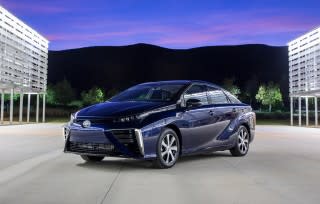Toyota, Honda, Nissan Set Details Of Hydrogen Network In Japan
If hydrogen fuel-cell cars are to succeed, region by region, they will need an adequate number of public fueling stations in each area where they're sold.
Carmakers have undertaken campaigns to build up electric-car charging infrastructure in multiple countries, but the much higher cost of hydrogen fueling stations makes similar efforts more difficult.
Nonetheless, the national government of Japan has shown a strong and continuing commitment to fuel-cell cars as part of its "Hydrogen Economy" vision.
DON'T MISS: Japan To Spend $385 Million On Hydrogen For 2020 Olympics Deadline
The three largest Japanese carmakers--Honda, Nissan, and Toyota--will now undertake a joint effort to support the construction of new fueling stations.
In a joint statement released yesterday, the three companies discussed details of the effort, first announced back in February.
As previously discussed, the measures taken will include underwriting some of the operating costs incurred by the infrastructure companies that build the fueling stations.

The carmakers will cover one third of operational expenses for stations in the program, with a cap of 11 million yen (about $90,000) per station.
Operators will have to reapply for funding each fiscal year, but so far the carmakers haven't indicated whether there will be a limit on how many stations will receive support.
The program will run until "FCVs become well established in the market and the development of hydrogen station infrastructure is well underway," according to the statement.
ALSO SEE: Japan Eases Laws, Boosts Incentives For Hydrogen Fuel-Cell Cars
That could be around 2020, the carmakers say.

 Yahoo Autos
Yahoo Autos 
